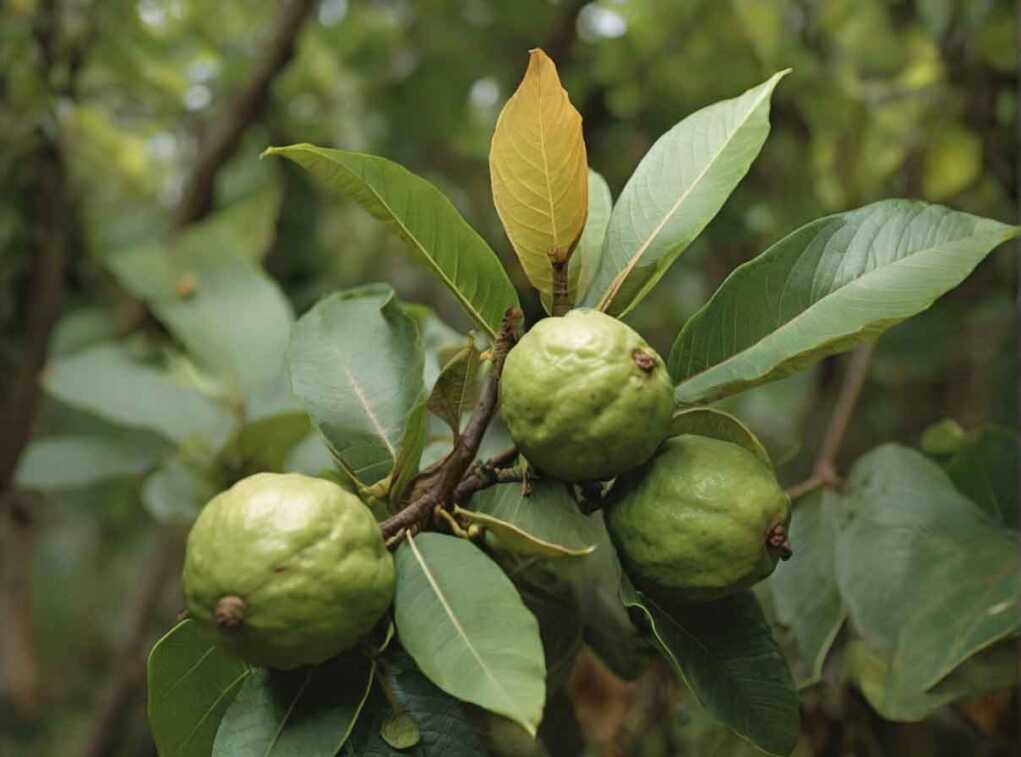
Could the humble guava tree growing across the tropics harbor healing answers to cancers afflicting both wealthy and impoverished nations? Extensive research suggests so.
Emerging investigations indicate extracts from Psidium guajava leaves exhibit potent anticancer effects against numerous human cancer cell lines spanning lung, breast, prostate, liver, colon, ovarian, cervical, gastric and skin cancers. [1–3]. Bioassays demonstrate guava leaf extracts suppress cancer cell proliferation, induce apoptosis and inhibit tumor metastasis and angiogenesis pathways. [1,4] Several bioactive phytochemicals have been isolated and contribute specific anticancer actions [4]. As guava plants grow abundantly across tropical and subtropical climates in Asia, Africa and South America, continued research into traditional guava leaf preparations as an economical complementary medicine for cancer is compelling [3,5].
Guajadial, a meroterpenoid enriched from guava leaf oil, significantly inhibits non-small cell lung cancer cells. Both in vitro and mouse model experiments demonstrate suppressed proliferation and migration of A549 and H1650 cells [2]. An associated fraction with further enrichment inhibited breast, prostate, colon, ovarian and skin cancer cells up to 100% at low microgram doses without harming normal cells [1].
Various other terpenoids, a novel benzophenone and diverse flavonoids identified confer cancer-selective antiproliferative, pro-apoptotic, anti-inflammatory and antioxidant effects [4–6]. For example, guavinoside C, guajadials D and E, apigenin and quercetin each inhibit lung, liver, breast, cervical and gastric cancer cells at higher potency than conventional agents like tamoxifen [4–7].
.png)
Several guava compounds act through complimentary molecular signaling pathways, including suppressing markers enabling proliferation (AKT, mTOR, S6K1), survival (Bcl-2) and metastasis (COX-2, VEGF). Others enhance caspase-mediated apoptosis or reactive oxygen species generation in cancer cells. A few extracts reduced colon cancer prostaglandins and DNA synthesis. One fraction potently restored antitumor immunity balance. [5-9]
While most research remains cellular, mouse models confirm certain guava leaf extracts and terpenoids reduced xenograft prostate and skin tumors by over 80%, outperforming leading chemotherapies minus excessive toxicity. Anti-inflammatory phytoestrogens likely contribute therapeutic activity against hormone-positive reproductive cancers akin to tamoxifen. [1,9]
This amalgam of preclinical evidence convinces guava’s traditional status as “cancer curer” merits modern reinvestigation. Bioassays indicate anticancer potential surpasses produce alone with leaf extracts eliciting 100-fold greater tumor inhibition. [10] Though genetics, preparation methods and solvents influence potency, hot water leaf infusions may provide accessible chemopreventive activity. [5] With breast cancer now the most common carcinoma afflicting over 2 million annually, everyday guava leaf tea could offer economical frontline protection between screenings. [11] Given amenable cultivation, locally sustainable guava leaf extracts also address financial barriers limiting cancer care access across Africa and Asia. [3,12]
However, exhaustive phytochemical profiling, pharmacokinetic studies and rigorous clinical trials remain lacking before formal guava extract adoption alongside surgery, chemotherapy and radiotherapy. While research continues, consuming traditional guava leaf preparations as supplemental infusions offers affordable nutrition with scientific support. After all, when it comes to combatting cancer’s global crisis, research shows we need all allies in arm’s reach, whether leaf or laboratory.
References:
- Rizzo, L. et al. Curr Med Chem. 2014. 21(21):2322-30.
- Wang, Y. Fitoterapia. 2018. 129:73-77.
- Lok, B. et al. Life. 2023. 13(2):346.
- Gao, Y. Nat Prod Bioprospect. 2013. 3(1):14-9.
- Kaileh M. et al. J Ethnopharmacol. 2007. 113(2):510-6.
- Feng, XH. et al. Bioorg Med Chem Lett. 2015. 25(10):2193-8.
- Priam, F. et al. Res Sq. 2021. Preprint.
- Ryu NH. et al. J Med Food. 2012. 15(3):231-41.
- Seo, N. et al. Anticancer Res. 2005. 25(6B):3763-70.
- Manosroi, J. et al. Cancer Lett. 2006. 235(1):114-20.
- WHO. Cancer Fact Sheet. 2022. Accessed: 2 February 2023.
- WHO. Press release. 2020. Accessed: 2 February 2023.
Important Notice: This article was originally published at https://greenmedinfo.com by GMI Reporter where all credits are due.
Disclaimer
The watching, interacting, and participation of any kind with anything on this page does not constitute or initiate a doctor-patient relationship with Dr. Farrah™. None of the statements here have been evaluated by the Food and Drug Administration (FDA). The products of Dr. Farrah™ are not intended to diagnose, treat, cure, or prevent any disease. The information being provided should only be considered for education and entertainment purposes only. If you feel that anything you see or hear may be of value to you on this page or on any other medium of any kind associated with, showing, or quoting anything relating to Dr. Farrah™ in any way at any time, you are encouraged to and agree to consult with a licensed healthcare professional in your area to discuss it. If you feel that you’re having a healthcare emergency, seek medical attention immediately. The views expressed here are simply either the views and opinions of Dr. Farrah™ or others appearing and are protected under the first amendment.
Dr. Farrah™ is a highly experienced Licensed Medical Doctor certified in evidence-based clinical nutrition, not some enthusiast, formulator, or medium promoting the wild and unrestrained use of nutrition products for health issues without clinical experience and scientific evidence of therapeutic benefit. Dr. Farrah™ has personally and keenly studied everything she recommends, and more importantly, she’s closely observed the reactions and results in a clinical setting countless times over the course of her career involving the treatment of over 150,000 patients.
Dr. Farrah™ promotes evidence-based natural approaches to health, which means integrating her individual scientific and clinical expertise with the best available external clinical evidence from systematic research. By individual clinical expertise, I refer to the proficiency and judgment that individual clinicians acquire through clinical experience and clinical practice.
Dr. Farrah™ does not make any representation or warranties with respect to the accuracy, applicability, fitness, or completeness of any multimedia content provided. Dr. Farrah™ does not warrant the performance, effectiveness, or applicability of any sites listed, linked, or referenced to, in, or by any multimedia content.
To be clear, the multimedia content is not intended to be a substitute for professional medical advice, diagnosis, or treatment. Always seek the advice of your physician or other qualified health providers with any questions you may have regarding a medical condition. Never disregard professional medical advice or delay in seeking it because of something you have read or seen in any website, video, image, or media of any kind. Dr. Farrah™ hereby disclaims any and all liability to any party for any direct, indirect, implied, punitive, special, incidental, or other consequential damages arising directly or indirectly from any use of the content, which is provided as is, and without warranties.








